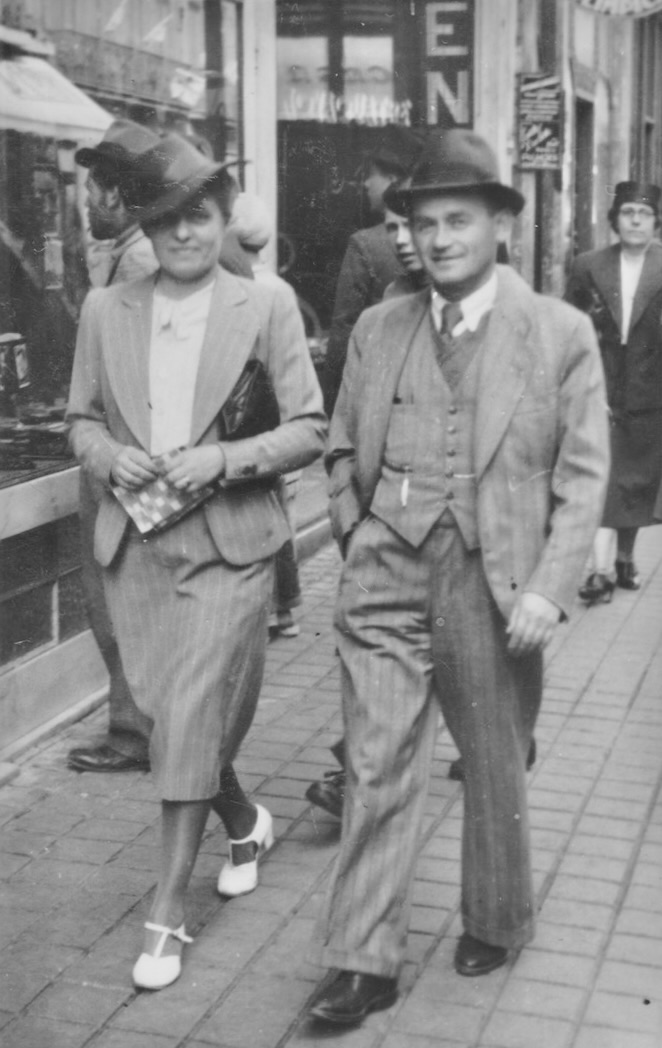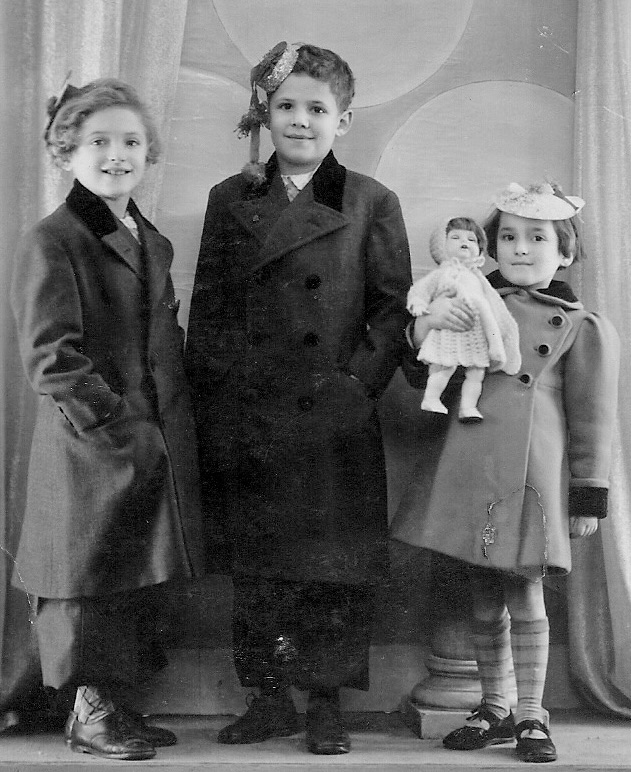Rubinsztein
Visa Recipients
- RUBINSZTEIN, Arnold P T
Age 11 - RUBINSZTEIN, Betty P
Age 8 - RUBINSZTEIN, Chana (Anka) née FLAKOWICZ P
Age 39 - RUBINSZTEIN, Louis P
Age 13 - RUBINSZTEIN, Mordka (Max) P
Age 45
About the Family
The RUBINSZTEIN family, a Polish family living in Belgium, received visas from Aristides de Sousa Mendes in France in June of 1940. They crossed into Portugal, where they resided first in Curia and then in Porto.
They sailed on the vessel Mouzinho to the Belgian Congo. In 1945 they travelled to South Africa and settled there.
Mordko's sister Mindla BEKERMAN also received a visa from Aristides de Sousa Mendes, together with her daughter.
Anka's brother Perec FLAKOWICZ and his family also received visas from Aristides de Sousa Mendes.
- Photos
- Testimonial
ARNOLD RUBINSZTEIN, MEMORIES OF A CHILD REFUGEE
PUBLISHED IN BOOK IN SACRED MEMORY BY GWYNNE SCHRIRE
My father and mother came from Poland. They emigrated to Belgium in 1929 or 1930 as there was no future for young Jews in Poland. They built up a big business on the main boulevard in Brussels and we lived in a large flat above it. As children we had many private teachers. Apart from having to go to school we had a professeur who would come every evening from 7 pm to 9 pm. Two or three times a week an old professor of music from the Conservatoire of Brussels came to teach me how to play the piano. He taught me more than how to play the piano - he taught me how to create music. He was a fantastic guy and I enjoyed it. Then we had a Hebrew teacher who came twice a week for my brother and myself. He loved Russian tea and would sip it noisily through a hard sugar lump. The lesson was 45 minutes but he would stay forever and ever. I think he liked our maid. With all those teachers, there was not much time for play but most of our free time was spent playing in my father's shop.
Every year we were sent for a two months holiday in a Pension Mayer at the beach in Blankenberg and we loved it. We had very little opportunity to enjoy the outdoors except on the occasions when the professeur would take us to the Bois de la Cambre or La Forêt de Soigne and we really enjoyed it. So our days were full, but I hated school!
On the 10th May 1940 Germany invaded Belgium. Brussels had not yet been invaded. My father organized our escape from Belgium - not only for the direct family but for quite a number of relatives as well. In fact it is amazing how efficient, calm and resourceful my parents were on what must have been one of the most traumatic days of their lives.
My father called us all in the morning and said we had to leave in a few hours. He told us that each child had to take just one suitcase and pack into it what we wanted. At first I put in my toys, then my hobbies, then eventually I packed in what I felt was really necessary - the shirts, trousers, underpants. While we were busy packing, one of the biggest textile manufacturers in Belgium who was a great friend of my father came to the flat and told my father, "Look, I have a big farm. You can go with your wife and children and live on the farm and I shall look after you and you do not have to pay a cent for the whole period of the war." My father always made good friends. People liked and trusted him. However he did not want to take such a chance.
My father then gave each of the three children a belt in which 12 gold sovereigns were concealed, and he explained to us that we should never change more than one at a time if it were necessary and he gave us an idea of the value of those sovereigns. It was impossible to take any money out of the bank that morning so he could only take what there was in the tills of his business. He also contacted one of his customers in Argentina who owed him some money and instructed him to keep back payment. (That money was paid to us in the Belgian Congo the following year.) So certain was my father that the war would be over in a very short period that on the door of his business he hung a big sign: "Back in three weeks."
As for me, I was so happy that I did not have to go to school. It was marvelous. That was what I was thinking about, that I did not have to go to school. How I hated school!
Eventually we left by car for a "holiday." At Knokke on the border of France we spent one night and the next day we went to Paris to a beautiful hotel. Paris was in complete chaos and my father was arrested by mistake. After 3 or 4 days we went to a little town not far from the French border called Dax, a well known spa, absolutely beautiful and calm. We were so sure about France being able to repulse the German army that I was even sent to school in Dax. I remember walking and seeing for the first time an aeroplane, a German plane, far above. Life was very peaceful and my parents seemed very happy. I made quite a few friends - there were lots of refugees there - obviously we did not feel the pressures of our parents.
When Paris fell on June 14th, it was a shock. No one had believed that the German army could conquer France so easily. We left Dax and went to the Spanish border to the town Hendaye. There were thousands of refugees. In order to go to Portugal you had to obtain a visa but the Portuguese consul in Bordeaux, Aristides de Sousa Mendes, gave everyone visas without having the authority to do so. Afterwards he was severely punished although Israel subsequently gave him recognition in Yad Vashem among the Righteous Gentiles.
I remember seeing those French soldiers ripping off the jewelry from poor ladies, wedding rings, all that they had with them - it was terrible. I remember seeing people hiding their jewelry in tea and coffee tins. All they had was what they had on themselves and in their suitcases. I remember seeing people selling their cars at the border for a few francs.
Spain at the time was under the dictatorship of Franco and when we went through it by train we could see the great poverty. Eventually we arrived in Portugal and went to a holiday resort, Curia. My parents organized the most complex problems without any difficulty. I don't know how they managed it and with very little money on them. The whole world was in complete chaos, and yet we were calm and at peace.
From Curia we went to Oporto and rented a room or two in a very small house. My mother was a top flight business woman who had never done domestic work before - yet four weeks after leaving her smart Belgian apartment she was living in a few rented rooms, cooking and cleaning without complaint.
Refugees were not allowed to work. My father discovered that there was a small difference in the rate of exchange in Oporto and Lisbon, so on Mondays he would exchange his total amount of money in Oporto into escudos and on Thursdays he would go to Lisbon and would change them back into dollars. The small difference that he got enabled us to survive.
The Portuguese were very good people and went out of their way to be kind and nice. I would walk with my brother and they would invite us to lunch - we had never seen such kindness before - or after. There was great poverty. In Oporto we lived for about 6 months and we felt that the war would not last long. In fact some of the refugees went back to France and Belgium because they had heard reports that the Germans were behaving in an honorable manner in spite of the fact that my father and mother and other refugees tried to dissuade them from going back.
I went to school in Oporto. I learned to speak Portuguese. It was a very interesting school because several standards were taught in one classroom all at the same time and I remember learning how to extract cubic roots. When you think about these poor people who were going to become shoemakers or tailors, having to learn to extract cubic roots - one realizes how impractical their whole school system was.
Despite the pressures my parents must have been under, they were very composed and efficient. This time in Portugal was probably one of the happiest periods that we as a family have experienced. I understood my parents much better at this time than previously, perhaps because they spent more time with me. My father used to tell beautiful stories in Yiddish. He had such a skill at telling stories that he used to go to coffee places and sit at the table with other refugees and me, the little boy next to him, to drink coffee for a few hours and tell stories and everyone would come to listen to him.
Twice a week we would go to a small grocery store and send pekelach - parcels - to my mother's large family in Poland. Each child could choose something that was needed or useful and we sent perhaps 12 parcels at a time not in our own name, but through a Portuguese firm. If we asked my mother what happened if the pekelach did not arrive she would say, "That is not our business. Our business is to send."
But the parcels did arrive intact and we found out after the war that these parcels made the difference between life and death, or between life and starvation
Eventually we left Oporto and took a boat to the Belgian Congo, the Mouzinho, 8000 tons. It took 2-3 weeks and went through Madeira.
So in these six months I was in Belgium.
I was in France - where I attended school.
I passed through Spain.
I went to Portugal - where I attended school.
(I even wrote essays in Portuguese.)
And I went to the Belgian Congo.





